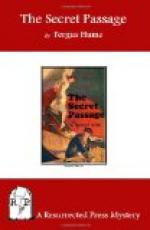The room was large and bare and empty. At one end there was a kind of dais on which was placed a few chairs. The young man walked up to this and turned to beckon Juliet, for whom he placed a chair. She still lingered at the door and seemed disposed to fly.
“Juliet, if you go now, all is over,” he said determinedly.
“Cuthbert, how can you?”
“Because I mean what I say. Things can’t go on like this. You think of your brother—of your mother. You never give a thought to me.”
Juliet came up the room hurriedly. “I am thinking of you all the time, Cuthbert,” she said angrily, “I keep silence for your good.”
“In what way?”
“This murder—” she began. Then her voice died away, “you know—”
“I know that Miss Loach was murdered, but who did it I don’t know.”
“Oh,” Juliet dropped into a chair, “are you innocent?”
“Surely you never thought me guilty?”
“I—I—don’t think you are, and yet—”
“You are going to accuse me of having been on the spot?”
Juliet could restrain herself no longer. “I saw you myself,” she burst out; “I was there also.”
CHAPTER XVII
JULIET’S STORY CONTINUED
Cuthbert was so surprised by this admission that astonishment held him silent for a moment. He never expected to hear that Juliet herself had been on the spot. Seeing this, she went— on quickly. “Now you can understand why I held my tongue. You were at Rose Cottage on that night. You have enemies who know you were there. I have been threatened should I insist on our engagement being fulfilled that you will be arrested. Therefore I kept away and held my tongue.”
“But if you had told me this long ago—”
“How could I?” she cried vehemently. “Could I come and say to you, I believe you are a murderer?”
“Did you believe that, Juliet?” he asked in a grieved tone.
“Yes and no,” she faltered. “Oh, Cuthbert, you know how I love you. I could not bring myself to think you were guilty— and yet the proofs are so strong. You were at Rose Cottage at a quarter to eleven—”
“No. I was there at a quarter past ten.”
“I tell you I saw you at a quarter to eleven. You were getting over the wall into the park. Then there was the knife—your knife.”
“How did you know it was mine?”
“By the notches. You told me you always cut three notches on the handle of any weapon you possessed. One day when mother and I came to afternoon tea at your place you showed me some of your weapons—the knife amongst them. One knife is much like another, and I would not have noticed but for the notches and for the fact that I saw you on that night. I hid the knife and Mr. Jennings—”
“He found it,” said Mallow. “Quite so. He told me he did. When you left the attic he contrived to—”




